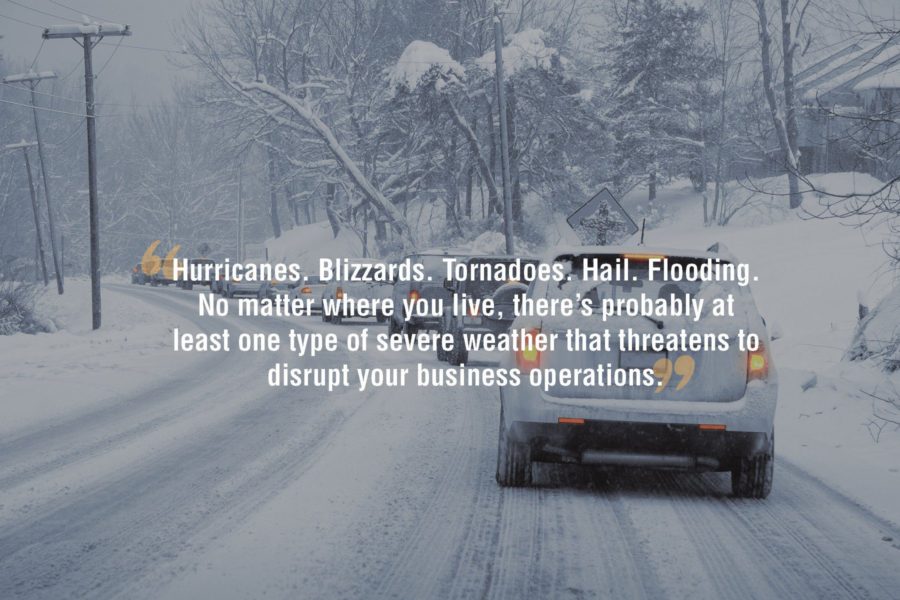Hurricanes. Blizzards. Tornados. Hail. Flooding. No matter where you live, there’s probably at least one type of severe weather that threatens to disrupt your business operations. When these bad weather events strike, the situation is often urgent, leaving little time to iron out policies and procedures in the moment. That’s why it’s important to have an inclement weather policy in place before the next storm hits.
Developing and Distributing an Inclement Weather Policy
For an inclement weather policy to be effective, it needs to be widely understood by both the managers and HR professionals who will be enforcing it and by the employees who will be impacted by it.
Including the inclement weather policy in the employee handbook is a simple way to ensure that it is read by all employees. The policy may also be published in other locations, such as an employee web portal, or posted in the break room.
Closing Due to Inclement Weather
The inclement weather policy may include information regarding how a decision to close the store or office will be made. For example, if the decision will be based on evacuation orders, road closures or storm warnings from government agencies, this information can be included.
Pay Policies for Employees
One of the biggest concerns that employees will have regarding business closures for bad weather is whether or not they will be paid. To avoid any confusion or disputes down the road, and to ensure that decisions are consistent and in line with all relevant laws, this information should be included in the inclement weather policy.
When developing a bad weather policy regarding employee pay, be sure to include different types of workers, such as exempt employees, non-exempt employees, full-time workers and part-time workers. Also address bad weather closures of different lengths, such as partial day closures, one-day closures, multi-day closures and extended closures.
State whether or not employees will be paid for hours missed during bad weather closures in various circumstances. Also, state how these hours may impact overtime calculations and other benefits.
When developing inclement weather pay policies, be sure to follow both state and federal requirements. For example, the U.S. Department of Labor states that, under the FLSA, employers do not need to pay non-exempt employees for hours that they did not work because of a natural disaster. However, state or local laws may establish additional requirements for non-exempt employees. Also, consider requirements for exempt employees.
Remote Work Policies
If work can be performed remotely, information on this should be included in the inclement weather policy.
For example, will employees who regularly work from home be expected to work when the business is closed due to inclement weather? Will employees who regularly work in the office be expected to work from home if inclement weather closures prevent them from coming to your workplace?
Unscheduled or Liberal Leave Policies
In some cases, bad weather may not be severe enough to warrant the closure of the business, but the weather conditions may be severe enough to prevent some employees from reporting to work. This can be an issue when some employees live in outlying rural areas, for example.
In the inclement weather policy, include information on how work missed due to severe weather will be handled, including any unscheduled or liberal leave policies and whether or not this leave is paid. Also clarify whether days missed due to inclement weather will be counted toward the employee’s vacation days.
Natural Disasters and Evacuations
In some cases, a natural disaster may trigger an evacuation order. Safety should always be the priority.
Evacuations can take time to plan, so requiring employees to work up until the last possible moment may not be feasible. When a natural disaster strikes, employees will have other concerns, such as taking steps to protect their property, helping friends and family, packing the supplies they will need and making alternate housing arrangements. When deciding when to close a store or office, take these needs into account.
Communication Plans
During an emergency, communication is essential. In your inclement weather policies, state how and when employees can find information on whether the business will be closing. For example, the policy may state that this information will be posted on the business website or Facebook page by a certain time. Also provide employees with contact information in case they have any questions or concerns.
Keep in mind that communication may be complicated by severe weather. Power outages may occur, and internet service may be disrupted. Have backup plans in case these problems occur. These plans might include websites, social media or text messages, for example.
Also make sure that the person or people responsible for communication have the information they need. If the contact information is at the office, but the communication manager can’t get to the office, for example, there will be a problem.
Emergency Plans
An inclement weather policy is just one part of the emergency plan. Other issues to consider include the following:
- If employees and clients or customers are stuck in a store or office, will they have the emergency supplies needed?
- What evacuation routes should be used by employees? Have more than one route in case one is blocked.
- What are the emergency contacts, and how can employees find this information?
- How will information be communicated to employees before, during and after an emergency?
- What possible dangers exist, and what steps should be taken to reduce these risks? For example, are there hazardous materials on site? Which files, equipment or other property need to be protected?
- How will business operations continue or resume during a prolonged emergency? Which business operations should be prioritized? Which employees will be responsible?
Return to Work
After a closure is announced, employees will need to know when to return to work. Let employees know where they will be able to find updates and information on when they are expected to report back. Once again, communication methods may be disrupted, so include backup plans, and provide employees with someone they can contact if they need help.
Safety should always be the priority. Before telling all employees to return to work, have the site inspected to make sure it is safe. If damage has occurred, repairs may need to be completed before workers can return.
HR Support
Do you need guidance crafting inclement weather policies or any other policies? Our HR services can support you with HR consulting, compliance guidance, payroll processing and more. On-site HR services are available. Contact our HR Services team to learn more.





